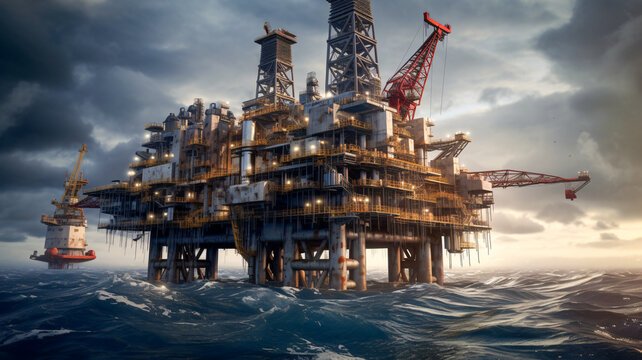The Future of Underwater Oil Rigs: Innovations and Challenges in 2024
In the ever-evolving landscape of energy production, underwater oil rigs stand as symbols of human ingenuity and our unyielding quest for resources. As we step into 2024, these structures not only represent the backbone of global energy supply but also serve as a focal point for innovation, sustainability, and environmental responsibility. Let’s delve into the realm of underwater oil rigs in the context of the year 2024.
Introduction
Underwater oil rigs, often towering structures amidst the vast expanse of the ocean, have been instrumental in accessing reserves buried beneath the seabed. These technological marvels facilitate the extraction of oil and gas, powering industries, transportation, and households worldwide. However, with the dawn of a new era marked by environmental consciousness and technological advancement, the landscape of underwater oil rigs is undergoing profound changes.

Technological Advancements
The year 2024 witnesses a paradigm shift in the technologies utilized in underwater oil rigs. Automation and artificial intelligence (AI) have permeated every aspect of rig operations, enhancing efficiency, safety, and environmental sustainability. Autonomous underwater vehicles (AUVs) equipped with advanced sensors and robotic arms undertake inspection and maintenance tasks, reducing human intervention and mitigating risks associated with underwater operations.
Furthermore, the integration of renewable energy sources such as solar and wind power augments the energy independence of underwater rigs, reducing their carbon footprint and dependency on fossil fuels. Cutting-edge drilling technologies, including advanced telemetry systems and real-time data analytics, optimize reservoir exploration and extraction, maximizing yields while minimizing environmental impact.
Environmental Considerations
The environmental implications of underwater oil rigs have long been a subject of debate. However, in 2024, the industry is at the forefront of adopting eco-friendly practices and embracing sustainability. Rig designs incorporate features to minimize disturbance to marine ecosystems, such as directional drilling techniques that reduce the need for extensive seabed infrastructure.
Additionally, stringent regulations and monitoring mechanisms ensure adherence to environmental standards, preventing oil spills and minimizing pollution risks. The industry’s commitment to responsible resource extraction is further underscored by investments in carbon capture and storage (CCS) technologies, aimed at mitigating greenhouse gas emissions associated with oil and gas production.
Challenges and Opportunities
Despite technological advancements and environmental initiatives, underwater oil rigs face a myriad of challenges in 2024. Geopolitical tensions, regulatory uncertainties, and market volatility continue to exert pressure on the industry, necessitating agile strategies and diversified portfolios. Moreover, the emergence of alternative energy sources and the growing momentum towards decarbonization pose existential threats to the traditional oil and gas sector.
However, amidst these challenges lie opportunities for innovation and adaptation. The transition towards renewable energy presents avenues for diversification, with many oil companies investing in offshore wind farms and hydrogen production facilities. Cross-industry collaboration and knowledge sharing foster synergies between traditional and emerging sectors, driving sustainable development and resilience in the face of global challenges.
Conclusion
As we navigate the complexities of the 21st century, underwater oil rigs serve as beacons of resilience and adaptability. In 2024, these structures embody the fusion of cutting-edge technology, environmental stewardship, and strategic foresight. By embracing innovation and sustainability, the industry not only secures its relevance in a rapidly changing world but also paves the way for a future where energy production harmonizes with ecological preservation.


Leave a Comment